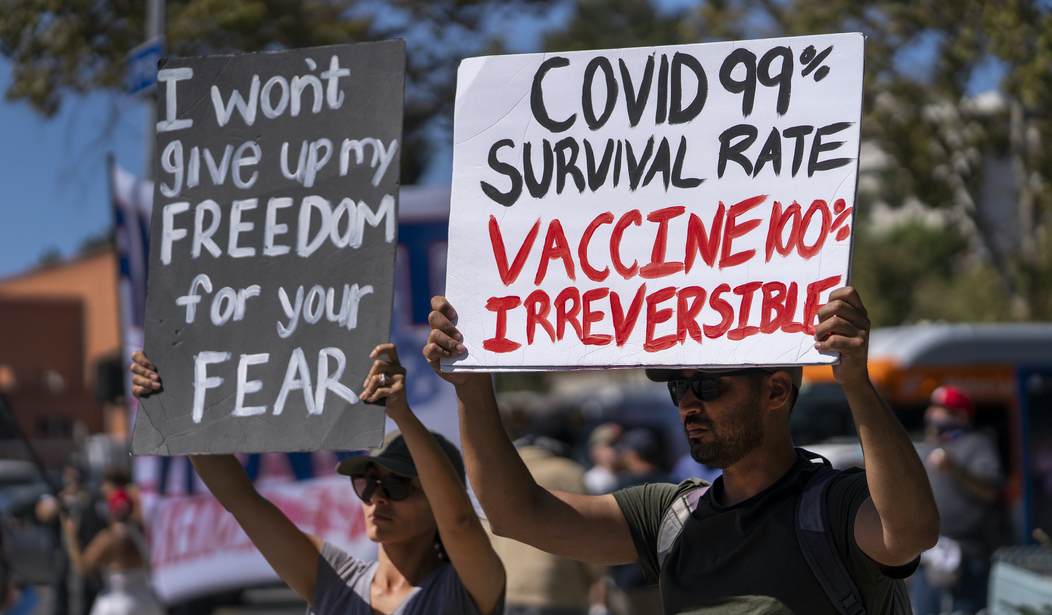Rational assessments of the COVID-19 pandemic are hard to find. Even though they don’t say it, it seems the Biden administration is pursuing a zero-COVID strategy. Dr. Fauci took to the Sunday shows this week and is still referring to “cases” as the metric to watch. In the U.S., this reflects the number of positive tests, which is a function of how much testing you do. Most experts realize that SARS-Cov2 is a virus we will be living with for the foreseeable future and see the need to figure out how to do so with minimal disruption.
Dr. Jay Bhattacharya is a Stanford epidemiologist and a healthcare economics professor. He is one of the authors of the “Great Barrington Declaration,” which advocated for a focused protection strategy against COVID-19 in October of 2020. This approach promoted protecting the elderly through public policy and letting others live with as few disruptions as possible. Bhattacharya also did some early COVID-19 seroprevalence studies in California, and Florida Governor Ron DeSantis sought his advice in crafting Florida’s pandemic response.
Of course, because his recommendations did not match the preferred narrative in the corporate media, you won’t catch him on CNN. However, recently he gave a wide-ranging interview to Jan Jekielek on “American Thought Leaders.” In it, he discussed a path to living with COVID-19 and gave some pointed advice to CDC Director Rochelle Walensky on restoring public trust in the health bureaucracy.
Related: The Never-Ending Pandemic: Dr. Fauci Plays Scrooge While Biden Resorts to Begging
Jekielek started the interview by asking Bhattacharya if he thought the strategy of focused protection had been successful. Bhattacharya cited Sweden, where children under 15 remained in school without restrictions throughout the COVID-19 pandemic. In the spring, the country experienced a significant wave of cases with only 7-8% of the population vaccinated, concentrated among the elderly. Even with the high case numbers, deaths remained very low. He noted that the U.K. experienced a similar pattern. “This sort of decoupling of cases and deaths was sort of characteristic of many countries that had had even limited vaccination as long as it focused on the old,” Bhattacharya noted.
“In the developed world, we’re also seeing enormous backlogs of people who did skip their cancer screening, enormous levels of psychological harm, depression, anxiety, suicidality,” he said. “Interestingly, suicide rates have not gone up in many places, but nevertheless, suicidality, depression, all those things have gone up quite a bit.”
Bhattacharya added, “And a lot of the sort of normal care that we would provide has been slipped by the wayside. So I think this is the kind of thing that has a long tail, right?”
During the interview, Bhattacharya shared that he took the vaccine in April and had three days of fever and fatigue due to a COVID-19 infection in August. He said that the reality of breakthrough cases and the fact that the virus has animal reservoirs means we have no technology to rid society of the virus. “This virus is in permanent circulation in human societies. And just to put a fine point on it, or not too fine a point about it, I think everyone on the face of the earth will face COVID at some point in their life if they don’t die before they get it. Everyone on the earth will face COVID. It’s not possible to rid any human society from COVID.”
Obviously, the public health system becomes essential in a situation like the one Bhattacharya describes, where we face latent health effects from lockdowns and an additional seasonal virus. They play a significant role in health education, screening, monitoring, and support. Unfortunately, many Americans see the health bureaucracy as politicized. Even healthcare providers have lost faith in the CDC and FDA.
Related: No One Trusts Public Health Officials — Not Even Health Care Professionals
Bhattacharya calls for a reckoning for high-profile public health officials. Americans tend to be forgiving if people admit they made a mistake. He said the way forward for people like CDC Director Rochelle Walensky is to admit that the advice provided by the agency did not always produce the promised results. “I mean, I, frankly, if I were in charge of the CDC, I would just apologize for the enormous mistakes that public health has made over the last 18 months and seek to start anew—seek to get trust of the public.”
“And I think that has to be the beginning of it, like some acknowledgment that things have gone deeply wrong, rather than trying to scapegoat, to take responsibility, that the orthodoxy that promoted these lockdowns, that oversold the vaccines, instead of using them for focused protection, promising, essentially, zero COVID with them,” Bhattacharya continued. “They should acknowledge that immunity after infection actually exists, acknowledge their errors, and then try to start over.”
He also gave some advice to political leaders. Noting that leaders engage in trade-offs, Bhattacharya suggested they get input from a wide range of people with different expertise and points of view. Then consider what the public will tolerate and explain the rationale for their policies carefully and clearly.
“I want my children to go to school. I want COVID control. I want cancer screening. I want a whole bunch of things. And we can’t always have all of them. And the political system helps navigate those goals,” he said. “You can’t avoid that, right? I think the nice thing about the liberal social order is there’s checks and balances to it. In a biosecurity state, like we kind of have had, essentially, there is no check. Who voted for Dr. Fauci?”
The answer to his final question is no one, of course. Yet, leaders in large swaths of the country, including the White House, have blindly followed his advice to pursue the zero-COVID-19 ideal. In the future, voters should reward the politicians who made tough calls while trying to balance multiple priorities.










